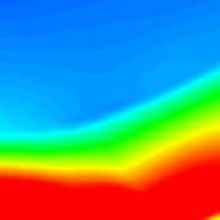Hasselt University organizes, in cooperation with Vlaamse overheid, fwo, ODYSSEUS and SFB 1313, a summer school on "Phase Field Modelling" at Hasselt University from June 24 to 26, 2019.
Date: June 24 to 26, 2019
Time: 9 am - 5 pm (all three days)
Place: Hasselt University, Campus Hasselt, Martelarenlaan 42, Faculty of Law, Room FR 1.02
Registration Deadline: June 11, 2019
About the Summer School
Many processes are described by physical laws expressing the conservation of mass, momentum, or energy, manifested through partial or ordinary differential equations. However, some processes, such as fracture propagation and two-phase flow, include a free or a moving interface, introducing the need to account for conservation laws in evolving domains. Across the moving interface there are usually discontinuities in physical parameters, for example in the density of the fluids.
The focus of the summer school is on phase field modeling, which is one approach to handle the moving interface and the across-interface discontinuities. Using phase fields, the transition across the interface is smoothed by allowing for a small, but nonzero, width of the interface. This smoothing allows for simpler numerical implementation, but also introduces a modeling error. Smoothening of the interface can be done in many ways and is hence not unique, so an important part of phase field modeling is showing that the phase field model reduces to the expected sharp-interface model in the limit as the width of the sharp interface approaches zero. For numerical implementation, special care must be taken to discretize the phase field equation consistently, to properly capture the behavior of the moving interface.
The goal of this summer school is to give the participants a basic introduction to the analysis and the numerics of phase fields. The focus will be on introducing the phase field concept including some physical applications, show how the phase field equation relate to other moving-boundary models, and numerical implementation. The summer school will therefore be amenable to mathematicians, engineers and scientists and will be presented in a genuine interdisciplinary context. The summer school will be open to participants having a basic knowledge in calculus and partial differential equations as they are taught to engineers and scientists. All sessions will be hands-on, meaning that sufficient time for exercises and their discussion is planned.
The lectures will be given by Jun.-Prof. Dr. Carina Bringedal (Universität Stuttgart), Prof. Dr. Harald Garcke (Universität Regensburg), Prof. Dr. Christian Rohde (Universität Stuttgart) and Prof. Dr. Thomas Wick (Leibniz Universität Hannover).
Audience
The course is addressed to PhD students and postdoctoral researchers working on topics involving the mathematical modeling of physical, chemical, environmental, biological and other engineering processes. It requires the standard mathematical background (calculus, partial differential equations, numerical methods) as taught at undergraduate/MSc level.


